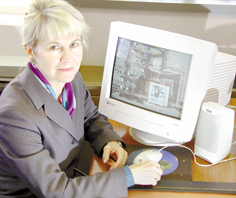|

TECHNOCATION - Biotechs lead fight against bioterror
November 7, 2001
By ELLEN WIGGINS,
Special to the Daily Record

As the specter of bioterrorism looms over our country, government officials and private citizens in Maryland and across the nation are turning to the biotechnology industry for a better understanding of this new threat to our health and security.

Today there is a new call to the biotech industry, reminiscent of the nationwide industrial shift from peacetime to military needs during World War II, to develop products for national and homeland defense.
As some as yet unknown enemy, foreign or domestic, attacks government officials and innocent civilians with potent anthrax spores by mail, the need for new diagnostics, vaccines, therapeutics, detection systems and decontamination agents is urgent.
Many biotech companies were already working on defense contracts prior to the attacks. Even more continue to develop dual use technologies for both civilian health care and military biodefense.
Vaccines do exist for potential biowarfare agents like anthrax, smallpox, plague and tularemia, and many more are in development for other pathogens.
However, the biotech industry and our nation face great challenges to make these vaccines safer, faster-acting (some require several booster shots to work properly) and most importantly, efficient and cost-effective for mass production.
Some vaccines are currently available only to the military due to the need for strict monitoring of booster shot schedules that would be tough in civilian life.
Others have potential side effects that were deemed more acceptable to battle-hardened soldiers in the midst of combat but would be dangerous to some members of the general population.
The biggest challenge is to overcome the shock of the attacks and get into a new mindset where conventional defense plans have been thrown out the window.
The world has changed since Sept. 11, and it seems to be changing rapidly with every day that passes. Industry must adapt even quicker to be effective.
Despite these challenges, many biotech firms are continuing on the right track. Columbia-based Meridian Medical Technologies, Inc., (Nasdaq:MTEC) was at the forefront of the industry prior to Sept. 11.
Back in May, two Meridian auto-injectors, a nerve agent antidote and an anticonvulsant, were added to the U.S. Department of Justice's state domestic preparedness equipment program's kit.
The DOJ program helps states improve their emergency preparedness in the event of a terrorist attack or other calamities.
Meridian's auto injectors are tools for paramedics, fire fighters and other emergency response workers who are first on the scene of a terrorist attack, natural disaster or industrial accident.
The spring-loaded, pen-shaped devices deliver precise doses of medicine quickly and safely.
The company's nerve agent antidote injectors are also part of the U.S. government's Metropolitan Medical Response System, which prepares the nation's 120 most populous metropolitan areas for natural or manmade disasters.
Not surprisingly, Meridian recently posted a 24 percent increase in earnings for fiscal 2001.
Frederick-based DynCorp Vaccine Company is the prime systems contractor for the Joint Vaccine Acquisition Program, a U.S. Department of Defense project working to protect American military personnel around the world.
The project develops, manufactures, stores, tests and deploys sufficient quantities of vaccines, licensed by the Food and Drug Administration, to protect U.S. troops against biowarfare agents.
Privately owned DVC has accelerated development of a smallpox vaccine since Sept. 11, and the product starts clinical trials in January.
BioReliance (NASDAQ: BREL) is another Maryland biotech that was already on the forefront of the bioterror fight prior to the attacks.
Almost a year before 9-11, the Rockville firm teamed with OraVax, Inc. for a U.S. Centers for Disease Control and Prevention contract to develop a 40-million-dose, national civil defense stockpile of smallpox vaccine.
That and another major contract for smallpox vaccines have been accelerated and expanded since the events of Sept. 11.
Although bioterror dominates recent headlines, other biotech products were used to treat victims of the Sept. 11 attacks.
Artificial skin was used to help burn victims, and artificial blood and improved surgical products have potential to help in case of future attacks.
Meanwhile vaccines for traditional illnesses like the flu and other antivirals or antibiotics will no doubt be used to treat soldiers and civilians suffering from naturally occurring pathogens as the war against terrorism continues.
Post 9-11, the conventional wisdom suggests that many Maryland companies will realize new business opportunities focused on national security issues.
The government will fund many of these opportunities but private investment in these firms will increase as well.
Development cycles for critical security products will shorten, resulting in more attractive returns on investment. It is essential that the nation's brainpower and financial resources, both private and public, support the country's fight against terrorism.
|